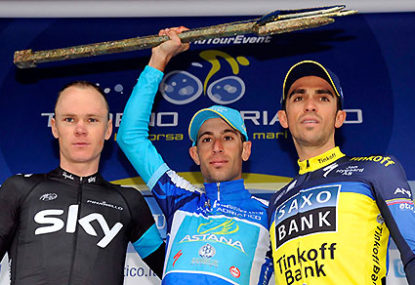'I've just won a stage of the Tour de France, mate!': Hindley grabs yellow jersey as Aussie blows Tour apart
Australia's Jai Hindley has said he is "lost for words" after a shock stage victory at the Tour de France earned him the leader's…

The legitimacy of Tour de France winners has taken a battering the last 20 years, but on Sunday Vincenzo Nibali stood atop the dais in Paris as the undisputed winner of the 2014 Tour.
Yes, defending champion Chris Froome crashed out on Stage 6.
Yes, Alberto Contador too failed to finish the race, falling from his machine and fracturing his tibia on Stage 10.
No, Nairo Quintana didn’t start the race, his Movistar team persisting with a leader in Alejandro Valverde who has never stood on the podium in Paris, and failed to yet again in 2014.
And while a 2015 Tour featuring Froome, Contador, Quintana and Nibali could be the greatest of all time, Nibali showed in 2014 he was the best bike racer at the Tour de France.
It’s easy to dismiss a Grand Tour as being determined by mountains and time trials, but it’s three weeks of racing. And while it’s rare to see a general classification contender lose time on a flat stage, staying out of trouble on these ‘easy’ days requires a strong team, good bike handling skills and some serious smarts.
Obviously Froome and Contador aren’t lacking for any of these, but at this year’s Tour, Nibali was better.
As Orica-GreenEDGE sport director Matt White said to Fairfax Media, “Cycling is about getting through dangerous, treacherous parts of a race.”
Whether Contador or Froome may have been better than Nibali in the mountains is neither here nor there – he beat them on the cobbles and in the wet. That’s how he won and why he deserves it.
Sure luck played its part, but luck plays a part in all sports, and as Luke Durbridge told Fairfax, “He has been super lucky, but also super skilled to be without any incidents. That is half the battle.”
Staying out of trouble was key to Cadel Evans’ 2011 Tour victory. While Evans’ Stage 20 time trial won him the Maillot Jaune from Andy Schleck, crashes early in the race saw the withdrawal of Bradley Wiggins, Alexander Vinokourov and Chris Horner – all of whom are now Grand Tour winners – while Contador lost serious time.
Does anyone consider Evans’ victory cheapened by the fact he stayed on his bike when others didn’t?
As an aside, Dutch newspaper De Telegraaf recently asked the 25 living Tour winners whether they thought Lance Armstrong’s titles should be reinstated.
Of the 23 who responded, 12 said Armstrong’s titles should be restored. Of those to have won since Armstrong’s final, 2005 title, only two believed they should stand – Andy Schleck and Oscar Pereiro.
What’s notable about this is that Schleck and Pereiro are the only two Tour winners to have been awarded their victories following the winner on the road being stripped of their title – Schleck winning 2010 from Contador and Pereiro taking Floyd Landis’ tainted 2006 title.
Some may suggest wanting a confessed doper to keep his record speaks of a guilty conscience, but to me it says more about the way both Schleck and Pereiro feel about their titles.
Not to take anything away from either of them, but to win a Tour weeks or years after its completion, having stood second on the podium and heard another man’s national anthem ring out across the Champs Elysees, is no cyclist’s dream. Their names appear in the record books with an asterisk next to them. Schleck even refers to his victory as being “on paper”.
Do you think in the years to come, Vincenzo Nibali will refer to his 2014 Tour de France victory as having occurred “on paper”? Or that Chris Froome or Alberto Contador will try to lay claim to the title, saying “If I’d been there at the end it would have been me”?
As spectators, it was a shame we missed the three-way battle between Froome, Contador and Nibali. But Nibali rode the same race in the same conditions as the other two. His victory stands without any asterisk, and will for the years to come.
Chapeau Vincenzo. And here’s to a cracking 2015 Tour!